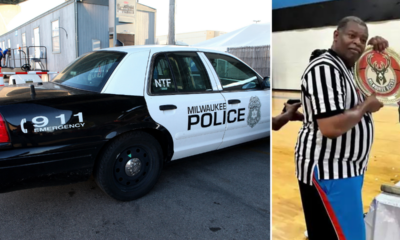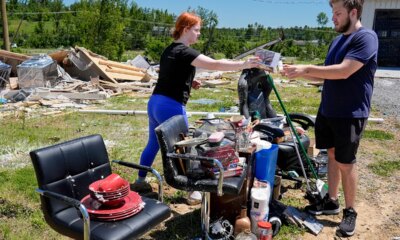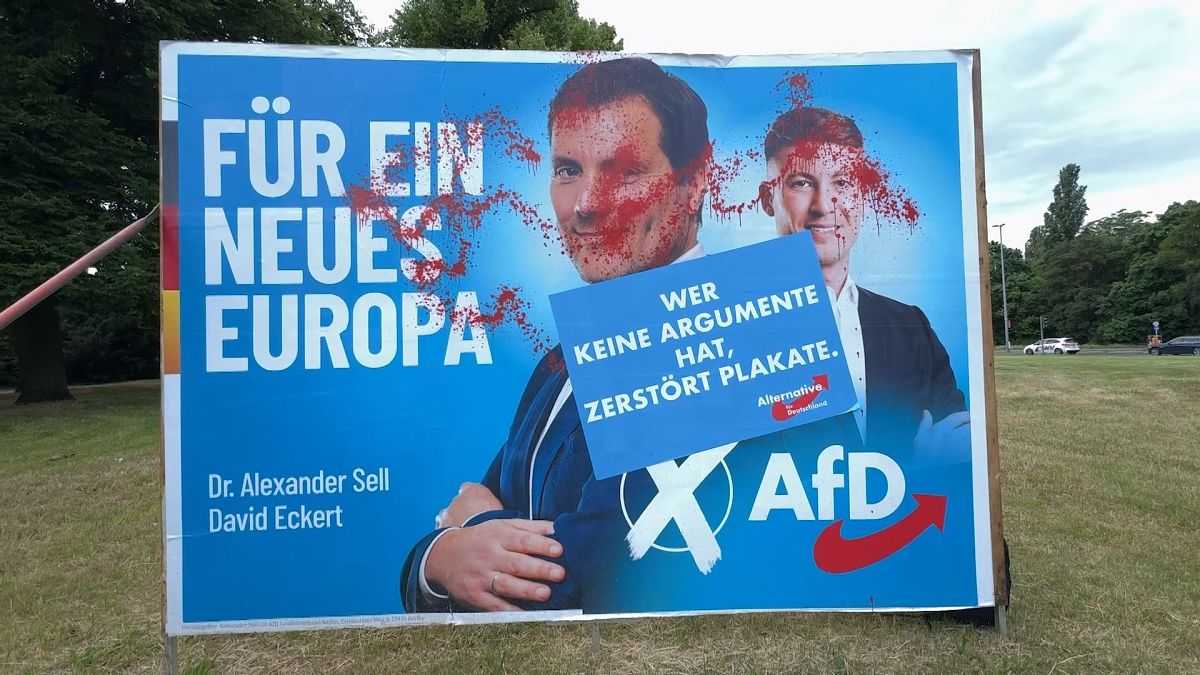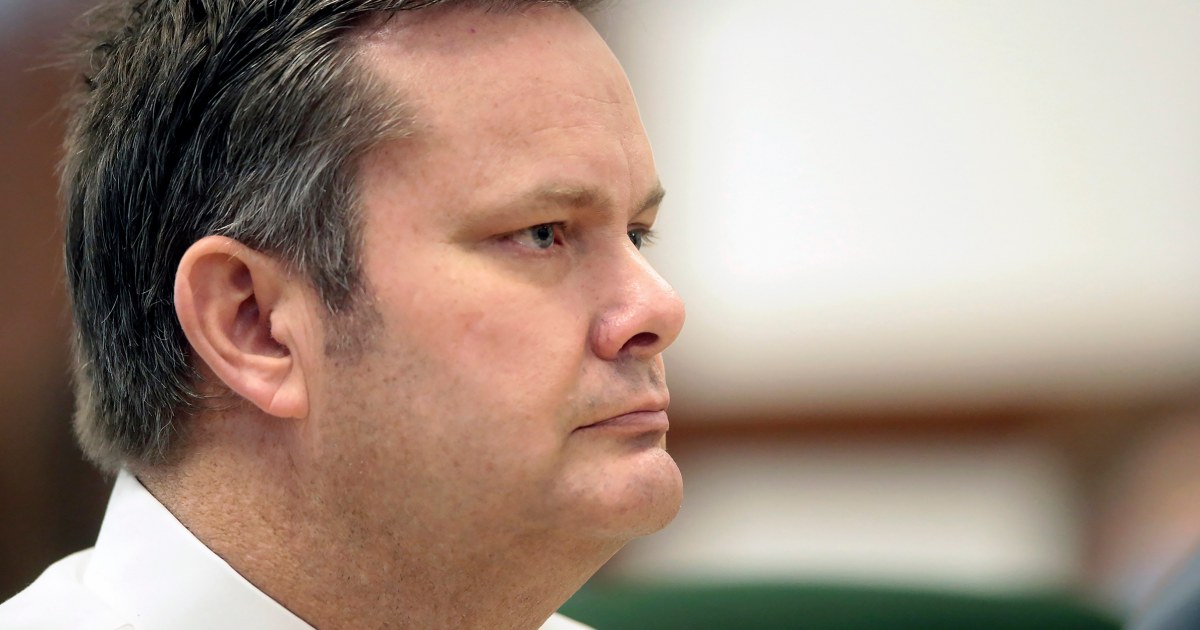Politics
Pete McCloskey, a decorated Marine veteran who wanted U.S. troops out of Vietnam and the first congressman to urge consideration of Nixon’s impeachment on the House floor, has died
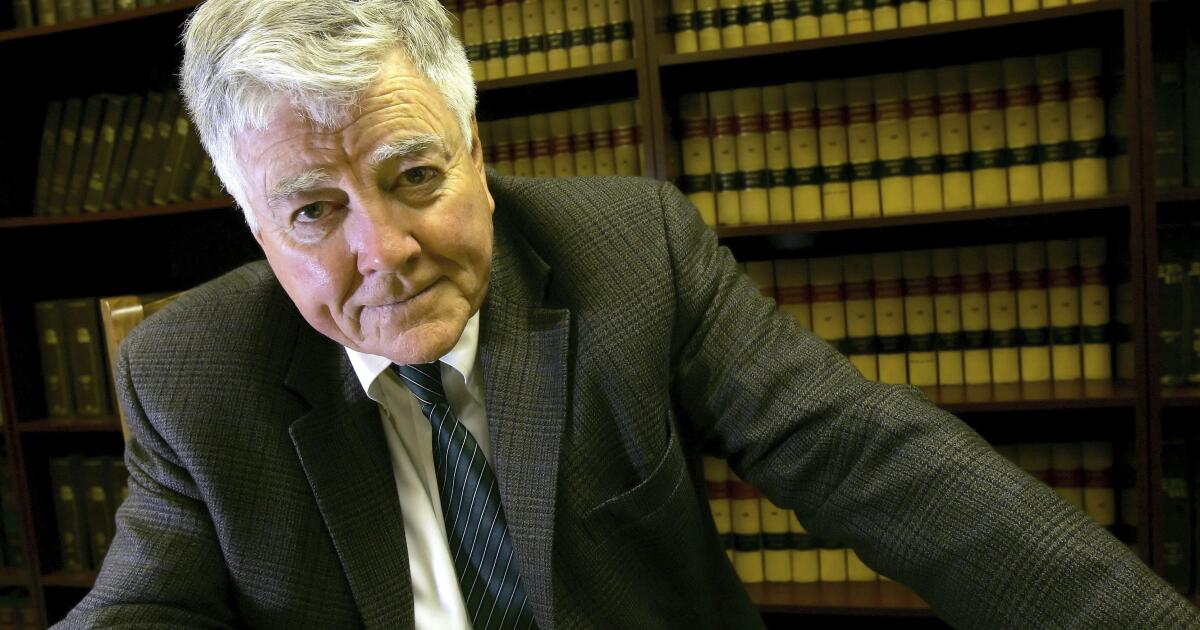
When Pete McCloskey challenged President Nixon for the Republican nomination in 1972, his defeat was nothing short of stunning. Only one of the 1,348 delegates at the Miami convention voted for McCloskey, and nobody gave a speech on his behalf.
Running to protest the war in Vietnam, the California congressman never expected to win, but he had no idea his short-lived campaign would cost him so many friends. Outside a basement meeting room at the Fontainebleau Hotel, someone said he must be the loneliest man in town, and he agreed.
“It’s always lonely at conventions like this,” McCloskey, haggard and hoarse, told reporters. “But then Patrick Henry was lonely when he talked about liberty.”
McCloskey was no revolutionary, but, as a decorated Marine veteran who wanted U.S. troops out of Vietnam and as the first congressman to urge consideration of Nixon’s impeachment on the House floor, he led a life of vigorous dissent.
A Stanford-educated attorney and an ardent outdoorsman, Paul Norton “Pete” McCloskey Jr. died Wednesday at his home in Winters, Calif., said longtime family friend Lee Houskeeper. McCloskey was 96.
The cause, Houskeeper said, was congestive heart failure.
“He was always somebody who had the ability to act from complete integrity and not rely on ideology or party pressure,” Helen McCloskey, the congressman’s wife of 42 years, said in an interview Wednesday night.
With a photogenic square chin and a shock of Kennedy-esque hair, McCloskey represented his San Mateo district in Congress from 1967 to 1983. In that period, he may have become “the only political figure in America who has managed to offend just about everybody,” his friend, actor Paul Newman, said in a trailer for a 2009 documentary.
His outspokenness about Vietnam earned McCloskey an exile, as he later characterized it, to the Merchant Marine and Fisheries Committee. But even in what he first considered a congressional backwater, McCloskey managed to upset many of his fellow Republicans.
“Well, the Congress then was much more inclined to be made up of 70-, 80- and 90-year-olds who had grown up at a time when development and progress was the keynote of the country,” he told The Times in 1985. “Environmentalists in those days were viewed as little old ladies in tennis shoes or nuts or cranks or kooks.”
In the relative obscurity of his position, McCloskey thrived. “I was able to help put together a coalition that quadrupled the money for clean water with this funny little bill called the National Environmental Policy Act,” he said. “I’ll tell you, if the Congress had known what was in it, that bill wouldn’t have passed.”
He co-authored the 1973 Endangered Species Act — “the one thing I was proudest of, in that miserable town called Washington,” he said in a 2012 interview with environmentalist Huey Johnson.
McCloskey was co-chair of the first Earth Day. Its Democratic organizers, reaching across the aisle in 1970, could find no other Republican willing to do it.
But not every Democrat was enthralled with the blunt-talking McCloskey, particularly after he started airing his views on the Middle East in the early 1980s. McCloskey supported Yasser Arafat, then chairman of the Palestine Liberation Organization, and angered Jewish organizations with his criticism of what he saw as “the Jewish lobby’s” undue influence over U.S. policies.
In 1982, McCloskey lost to future governor Pete Wilson in a primary election for the U.S. Senate. He told The Times that his controversial positions on Israel might have contributed to his defeat.
“He has been supportive of the Palestinian people’s plight since the late 1970s,” Helen McCloskey said. “Of course, now that is very relevant.”
Returning to California, McCloskey practiced law in the San Francisco area before cutting back his hours and moving to a ranch near the tiny Yolo County town of Rumsey.
Raising Arabian horses and growing organic olives and oranges, McCloskey made a quixotic primary run in 2006 against Rep. Richard Pombo, a longtime Republican congressman known for his opposition to environmental regulations. McCloskey lost but was credited by Democrats with weakening Pombo, who was defeated in the general election.
A year later, McCloskey, repelled by a series of influence-peddling scandals and the George W. Bush administration’s “misdeeds and incompetence,” switched parties. For 59 years he had been a Republican, but in an email to local newspapers, the fledgling Democrat decried “the stench of Jack Abramoff” and declared of Republican leaders: “A pox on them and their values.”
McCloskey was born in San Bernardino on Sept. 29, 1927, and raised in South Pasadena. His father and both grandfathers were attorneys.
After graduating high school in 1945, he served in the Navy until 1947. He earned an undergraduate degree at Stanford in 1950 and signed on with the Marines for combat in Korea. His commendations included the Navy Cross, the Silver Star and, for wounds received while leading a rifle platoon, two Purple Hearts.
At a Christmas party in 2011, he gave one of them to then-Rep. Jackie Speier, a Democratic lawmaker from Hillsborough. As an aide to Rep. Leo Ryan in 1978, she was shot five times while helping to evacuate defectors fleeing Jonestown, the Guyana commune where some 900 people died in a massacre.
“She earned it,” McCloskey told The Times. “She got hurt worse than I did.”
McCloskey’s wounds were also emotional. Suffering from post-traumatic stress disorder, he had recurring dreams of peering into a trench and emptying his weapon into young, terrified enemy troops.
In 2014, he traveled to North Korea and arranged to meet with a war veteran from the other side — a retired three-star general who, like McCloskey, had been wounded.
“I told him how bravely I thought his people had fought, and we embraced,” McCloskey told The Times. “We ended up agreeing that we don’t want our grandchildren or great-grandchildren to fight, that war is hell, and there’s no glory in it.”
McCloskey is survived by Helen — his longtime press secretary whom he married in 1982 — and four children by his first wife: Nancy, Peter, John and Kathleen.
The relationship between McCloskey and Helen, who was 26 years his junior, is the subject of a documentary film, “Helen and the Bear,” made by their niece, Alix Blair, which premiered at the Hot Docs Festival in Toronto last month.
Helen McCloskey said her husband had a bawdy sense of humor and “was very open-minded in the most wonderful way.”
When he was 82, she said, she asked him: “‘Would you like to try magic mushrooms?’ And, oh my God, he loved them.” The PTSD-afflicted congressman, she said, awoke from his first trip and said: “Why is that illegal?”
“He was never old,” Helen said. “A lot of people, when they get older they kind of defend the box that they’ve created that they think the world fits into, and anything new, they either deplore or condemn. Pete was never like that.”
Chawkins is a former Times staff writer.

Politics
Trump guilty on all counts in New York criminal trial
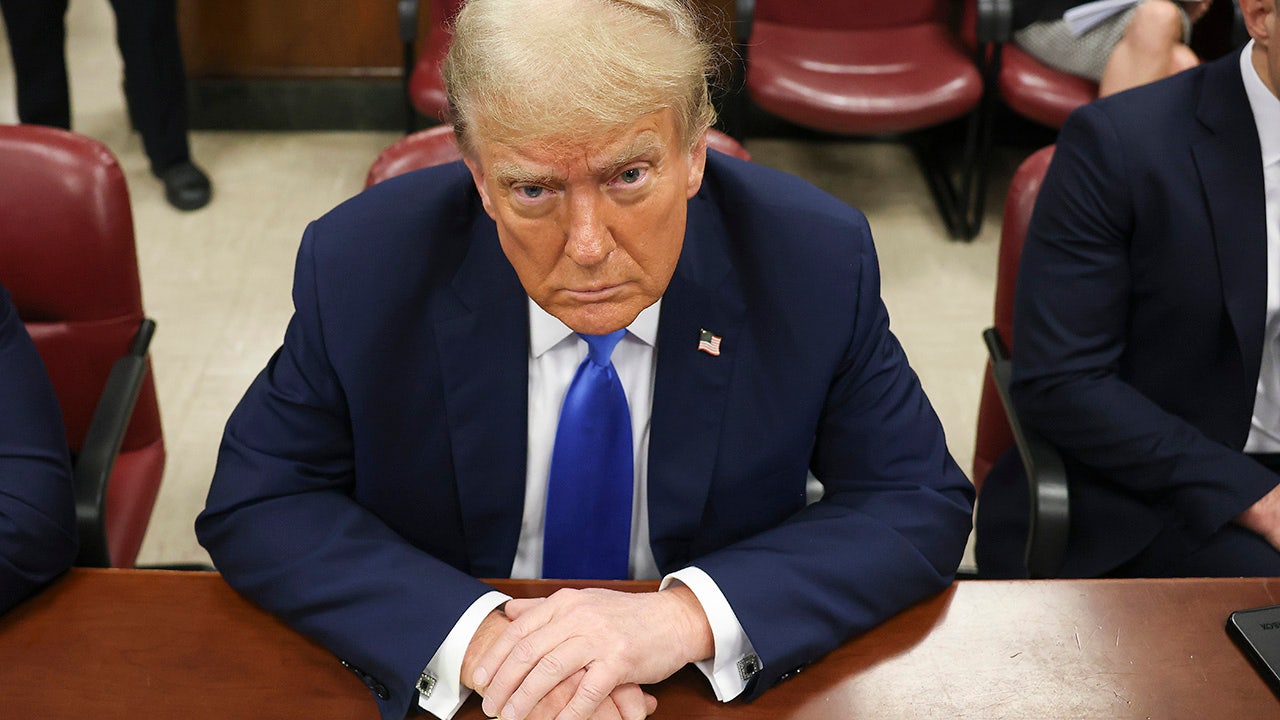
Former President Trump was found guilty on all counts in his historic and unprecedented criminal trial, making him the first former president of the United States to be convicted of a crime.
Manhattan District Attorney Alvin Bragg charged former President Donald Trump with 34 counts of falsifying business records in the first degree.
Trump pleaded not guilty to all counts.
Jurors found the former president guilty on all counts.
Each count carries a maximum prison sentence of 4 years. In total, Trump faces a maximum sentence of 136 years.
Judge Juan Merchan invited the jury into the courtroom to read its verdict after two days of deliberations.
Sentencing for the former president will be July 11 at 10:00 a.m–just five days before the start of the Republican National Convention, where he is expected to be formally nominated as the 2024 Republican presidential nominee.
Any motions will need to be filed by June 13th.
Prosecutors needed to prove beyond a reasonable doubt that Trump falsified those records to conceal a $130,000 payment to Stormy Daniels, a pornographic performer, in the lead-up to the 2016 election to silence her about an alleged affair with Trump in 2006.
TRUMP PREVIEWS CLOSING ARGUMENTS IN ‘SHAM TRIAL’: ‘VERY DANGEROUS DAY FOR AMERICA’
Former president Donald Trump awaits the start of proceedings at Manhattan criminal court, Monday, April 22, 2024, in New York. (AP Photo/Yuki Iwamura, Pool)
Moments after the verdict was delivered by the jury, the former president spoke to reporters in the hallway outside the courtroom.
“This was a disgrace. This was a rigged trial by a conflicted judge who was corrupt as a rigged trial and disgrace. It wouldn’t give us a venue change,” Trump said. “We were at five percent or 6% in this district, in this area. This was a rigged, disgraceful trial.”
Trump said “the real verdict is going to be November 5th by the people.”
“And they know what happened here and everybody knows what happened here,” Trump said. “You have a Soros backed DA and the whole thing.”
He added: “We didn’t do anything wrong. I’m a very innocent man. And it’s okay. I’m fighting for our country. I’m fighting for our Constitution. Our whole country is being rigged right now.”
Trump said that the case was “done by the Biden administration in order to wound or hurt an opponent, a political opponent.”
“And I think it’s it’s just a disgrace. And we’ll keep fighting–we’ll fight till the end and we’ll win because our country’s gone to hell,” he said. “We don’t have the same country anymore. We have a divided mess. We’re a nation of decline, serious decline.”
Trump said “millions and millions of people pouring into our country right now from prisons and from mental institutions, terrorists. And they’re taking over our country. We have a country that’s in big trouble.”
“But this was a rigged decision right from day one, with a conflicted judge who should have never been allowed to try this case. Never,” he said. “And we will fight for our Constitution. This is long from over.”
During closing arguments, defense attorneys for former President Trump told the jury Tuesday he is innocent, did not commit any crimes and that Bragg “did not meet the burden of proof. Period.”
“President Trump is innocent. He did not commit any crimes. The district attorney did not meet the burden of proof. Period,” Blanche said.
Blanche added that the case is “simple” and it is “not a guilty verdict.”
“This case is about documents; it is a paper case,” Blanche said. “This case is not about an encounter with Stormy Daniels 18 years ago. It is not even about a nondisclosure agreement signed eight years ago.”
Blanche said the charges are about whether Trump “had anything” to do with payments to his ex-attorney, Michael Cohen, on his personal accounting ledger.
“The answer? The bookings were accurate and there was no intent to defraud and there was no conspiracy to influence the 2016 election,” Blanche said. “The proof doesn’t add up.”
NY V TRUMP: PROSECUTION SAYS THEY HAVE PRESENTED ‘POWERFUL EVIDENCE’ AGAINST FORMER PRESIDENT
Blanche told the jury they cannot convict Trump based on Cohen’s testimony, recalling how Trump’s ex-attorney “took the stand and then lied.”
“The records are not false and there was no intent to defraud,” he said.
Blanche said not one single invoice was sent to Trump directly and that Cohen billed Trump “for services rendered.” He also told the jury Cohen rendered services as Trump’s personal attorney in 2017.
Blanche noted Cohen had lied to both Houses of Congress, federal judges, state judges and family.
“You cannot send someone to prison based upon the words of Michael Cohen,” Blanche said, adding that a verdict needs to be reached based on evidence from documents and witnesses. “If you do that, this is a very quick and easy not-guilty verdict.”
Meanwhile, prosecutor Joshua Steinglass delivered his closing argument for more than five hours Tuesday, saying the prosecution has presented “powerful” evidence in their case against Trump.
Steinglass said Trump’s intent to defraud “could not be any clearer,” arguing that it would have been far easier for him to pay Stormy Daniels directly. Instead, the prosecutor said, he concocted an elaborate scheme and everything he and his cohorts did was “cloaked in lies.”
“The name of the game was concealment and all roads lead inescapably to the man who benefited the most: the defendant, former President Donald Trump,” Steinglass said.
Steinglass defended the prosecution’s use of Michael Cohen as a witness, telling the jury: “I’m not asking you to feel bad for Michael Cohen. He made his bed.”
“But you can hardly blame him for making money from the one thing he has left, which is his knowledge of the inner workings of the Trump Organization,” he said.
“We didn’t choose Michael Cohen to be our witness. We didn’t pick him up at the witness store,” Steinglass said. “The defendant chose Michael Cohen to be his fixer because he was willing to lie and cheat on the defendant’s behalf.”
Trump defense attorneys, in their second attempt to dismiss the case earlier this month, said no evidence had been presented by the prosecution to connect the former president to any falsification of business records. Defense attorneys motioned for dismissal after Michael Cohen, Trump’s former attorney and the prosecution’s “star witness,” finished his testimony.
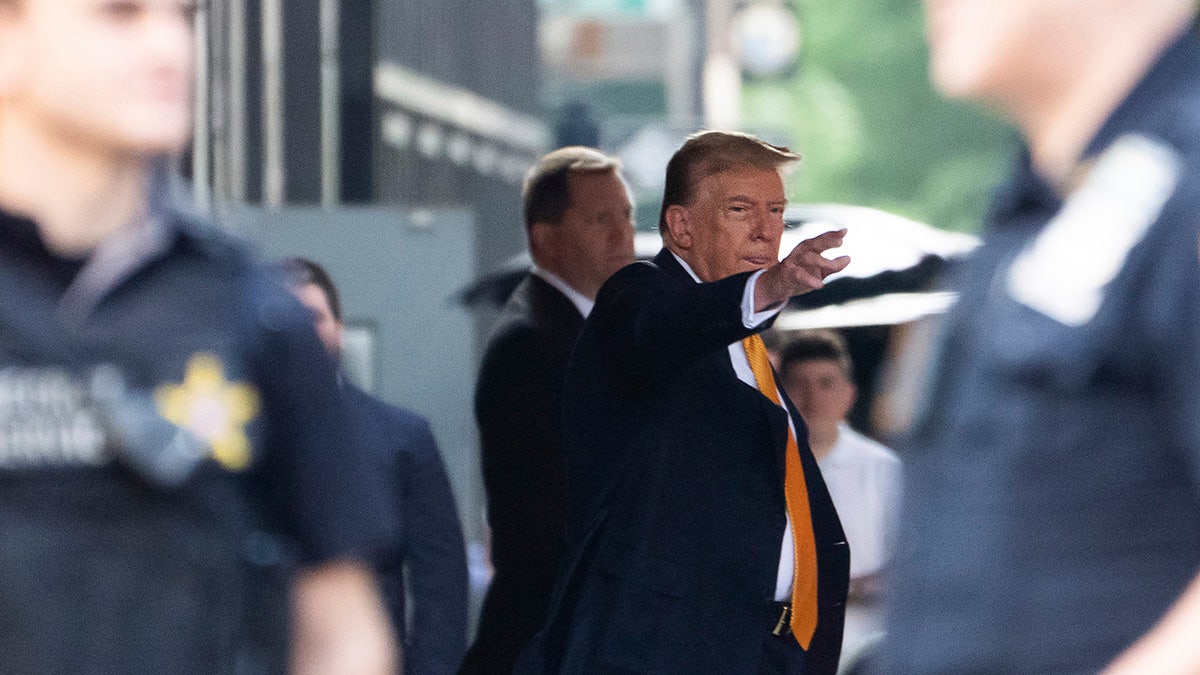
Former president Donald Trump waves while leaving Trump Tower on his way to Manhattan criminal court, Tuesday, May 21, 2024, in New York. (AP Photo/Julia Nikhinson)
He testified that he personally made the $130,000 payment to Daniels using a home equity line of credit in an effort to conceal the payment from his wife. Cohen said he did this because Trump told him to “handle it” and prevent a negative story from coming out ahead of the election.
But Trump’s defense attorneys maintained that the president never directed Cohen to do so.
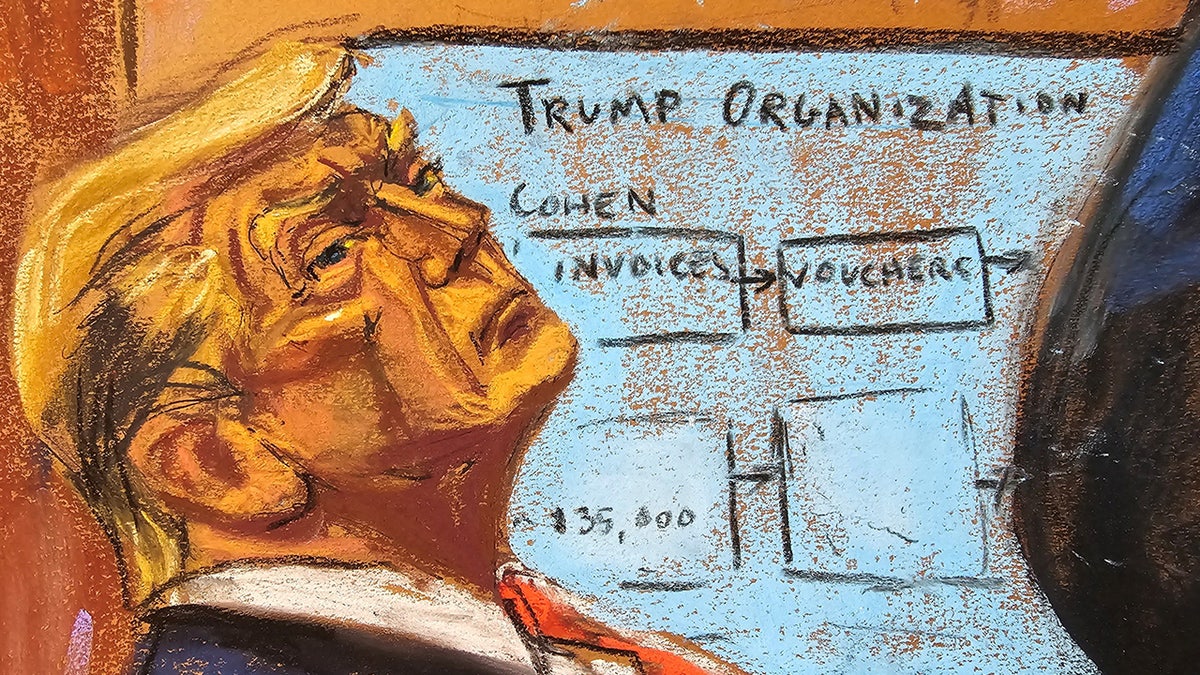
Former U.S. President Donald Trump listens as defense lawyer Todd Blanche presents closing arguments duri (REUTERS/Jane Rosenberg )
Cohen testified that he was “reimbursed $420,000” for the $130,000 he paid to Daniels. Cohen said former Trump Organization CFO Allen Weisselberg suggested he “gross up” the payments and that Trump knew the details of the reimbursement.
The prosecution presented Cohen with 11 checks totaling $420,000. Cohen confirmed that they were all received and deposited. The checks had a description of a “retainer,” which Cohen said was false.
This is a developing story. Please check back for updates.
Politics
Supreme Court gives National Rifle Assn. a 1st Amendment win in suit against New York officials
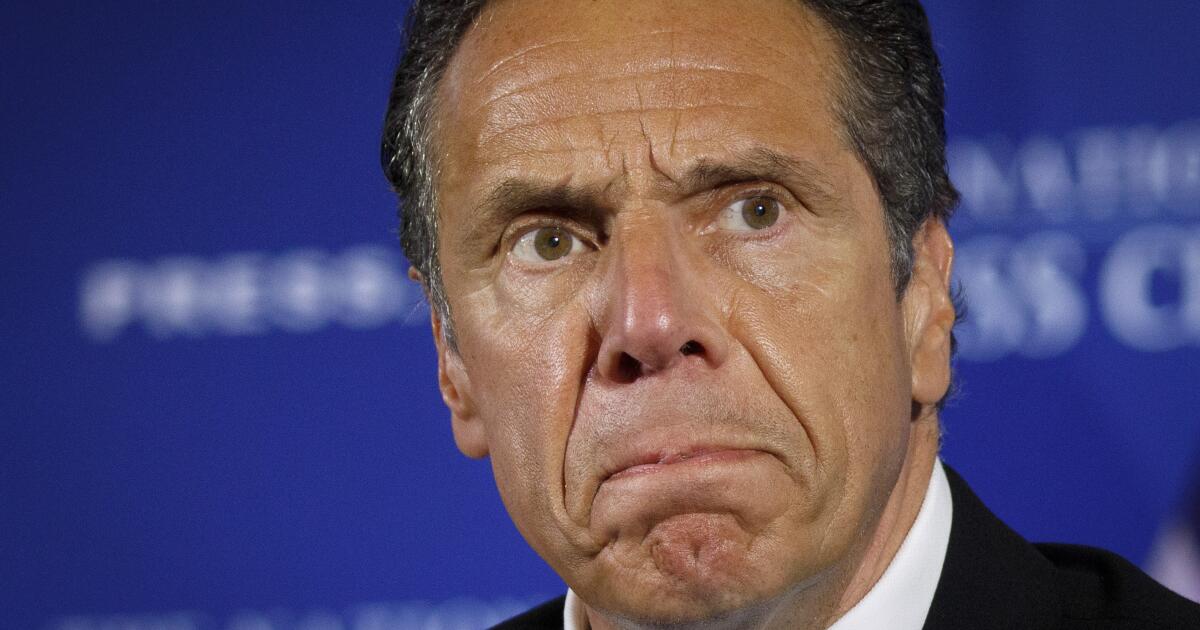
The National Rifle Assn., best known for advocating for gun rights under the 2nd Amendment, won an unusual 1st Amendment free-speech decision from the Supreme Court on Thursday.
In a 9-0 ruling, the justices agreed the NRA had a plausible free-speech claim that it had been targeted for harassment and threatened by state financial regulators in New York because of its advocacy for gun rights.
“Government officials cannot attempt to coerce private parties in order to punish or suppress views that the government disfavors,” Justice Sonia Sotomayor said for the court.
In the past, the court has said public officials have free speech rights to advocate for their policies and to encourage others to follow their guidance.
But in this case, the court said state officials can go too far and violate the 1st Amendment if they use their authority to threaten or punish organizations whose views they oppose.
The NRA said it sued then-New York Gov. Andrew Cuomo and Maria Vullo, his state superintendent for financial services, after they issued formal guidance letters urging every bank and insurance company to “sever their ties” with the gun rights group.
Cuomo tweeted: “We’re forcing the NRA into financial jeopardy. We won’t stop until we shut them down.”
The NRA sued, alleging the group was being punished for its views in violation of the 1st Amendment. Their claim was tossed out by the the 2nd Circuit Court in New York, which said Vullo’s words were “intended to persuade rather than intimidate.”
But the Supreme Court agreed to hear the NRA’s appeal and all nine justices said words and actions of the state superintendent looked more like official threats and a misuse of government power.
“In sum, the complaint, assessed as a whole, plausibly alleges that Vullo threatened to wield her power against those refusing to aid her campaign to punish the NRA’s gun-promotion advocacy. If true, that violates the 1st Amendment,” Sotomayor said.
The ACLU’s national legal director David Cole had argued the case on behalf of the NRA. This “was a campaign by the state’s highest political officials to to use their power to coerce a boycott of a political advocacy organization because they disagreed with its advocacy,” he told the justices.
Cole and the ACLU welcomed the ruling. “Today’s decision confirms that government officials have no business using their regulatory authority to blacklist disfavored political groups,” he said.
“While the ACLU stands in stark opposition to the NRA on many issues, it represented the group to safeguard the 1st Amendment rights of all advocacy organizations,” he said. “Across the country, organizations in the fight for racial justice, criminal legal reform, reproductive and LGBTQ rights too often face attacks by state and local government overreach officials who disagree with their point of view. If the court had allowed New York to blacklist a powerful organization like the NRA, government officials would have had even greater power to target less powerful organizations — especially those who speak for our most vulnerable communities.”
The line between government persuasion and official threats has drawn the court’s attention this year. Still pending is the Biden administration’s challenge to a Louisiana judge’s order that accused the White House of “government censorship” of conservative views on social media.
The administration said it had alerted these platforms about disinformation regarding COVID-19 and vaccines, and urged these posts be taken down. State attorneys from Louisiana and Missouri sued and described this as censorship.
In March, the justices heard arguments in this case, Murthy vs. Missouri, on the same day they heard the NRA’s case.
Solicitor Gen. Elizabeth Prelogar said the officials who contacted social media sites did not use threats. Instead, she said, they warned the social media platforms about false and dangerous postings.
But the justices sounded divided and at times, hinted they might dispose of the case by ruling that state attorneys did not have standing to sue on behalf of the platforms.
The administration also backed the NRA’s free-speech claim, but it urged the justices to make clear that government officials cannot be sued simply for strongly arguing against the views of groups like the NRA.
Sotomayor’s opinion does that. “Nothing in this case gives advocacy groups like the NRA a right to absolute immunity from [government] investigation, or a right to disregard [state or federal] laws,” she wrote. “Similarly, nothing here prevents government officials from forcefully condemning views with which they disagree.”
Politics
Trump says costly trial is 'proving my point' that courts are weaponized against him: 'Disgrace'
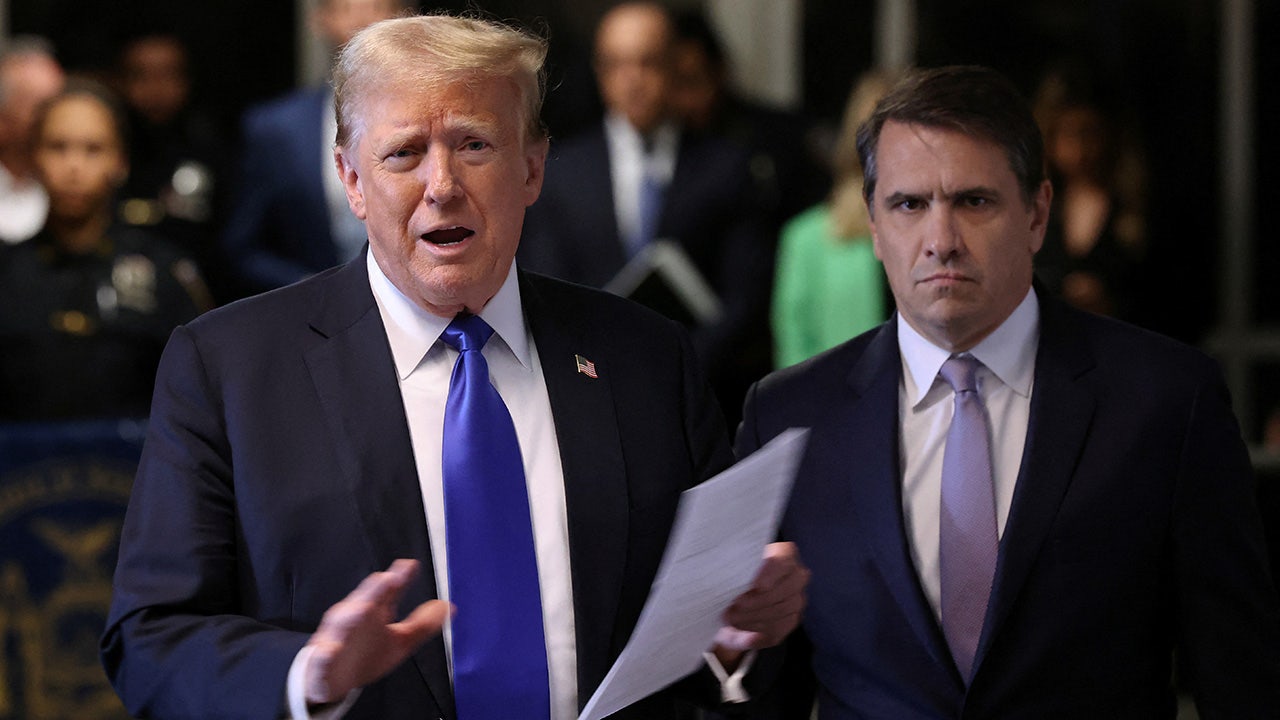
Former President Donald Trump said prosecutors in the costly and unprecedented NY v. Trump trial are “proving” his point that the legal system is weaponized against him.
“‘This is becoming a three-card Monte game on: Where is the crime?’ Smart guy. Where’s the crime?” Trump said Thursday outside the Manhattan courtroom, reading insight from Fox News contributor and legal scholar Jonathan Turley before reading excerpts from other experts. “Mike Davis: ‘The U.S. would sanction a country for doing this.’ I think that’s good. I think that’s good. Steve Hilton: ‘It seems that every single day these proceedings go on, the judge or the prosecutor just go out of their way to prove Trump’s point.’”
Trump added after reading the excerpt: “…They are proving my point when you think. That’s why I write some of these things that are very sad.”
Trump has continually slammed the case as a “sham” and that presiding Judge Juan Merchan is “corrupt” and “conflicted,” appearing to refer to the judge’s familial ties to the Democratic Party. Trump has also lambasted the case as “lawfare” promoted by the Biden administration to hurt his chances of succeeding in the 2024 presidential election.
NY V. TRUMP: JURY TO CONTINUE DELIBERATIONS FOR 2ND DAY IN UNPRECEDENTED CASE
Former U.S. President Donald Trump, alongside his attorney Todd Blanche, speaks to the media as he arrives for his criminal trial for allegedly covering up hush money payments at Manhattan Criminal Court on May 30, 2024 in New York City. Judge Juan Merchan gave the jury their instructions, and deliberations are entering their second day. The former president faces 34 felony counts of falsifying business records in the first of his criminal cases to go to trial. (Michael M. Santiago/Pool via REUTERS)
Trump is back in court Thursday as the jury continues deliberations regarding whether Trump is guilty of falsifying 34 business records. Prosecutors worked to prove that Trump falsified business records to conceal a $130,000 payment to former porn star Stormy Daniels ahead of the 2016 election to quiet her claims of an alleged affair with Trump in 2006.
NY V. TRUMP: DEFENSE SAYS PROSECUTORS ‘DID NOT MEET THE BURDEN OF PROOF,’ FORMER PRESIDENT IS ‘INNOCENT’
Trump has pleaded not guilty to all counts and denied an affair with Daniels.
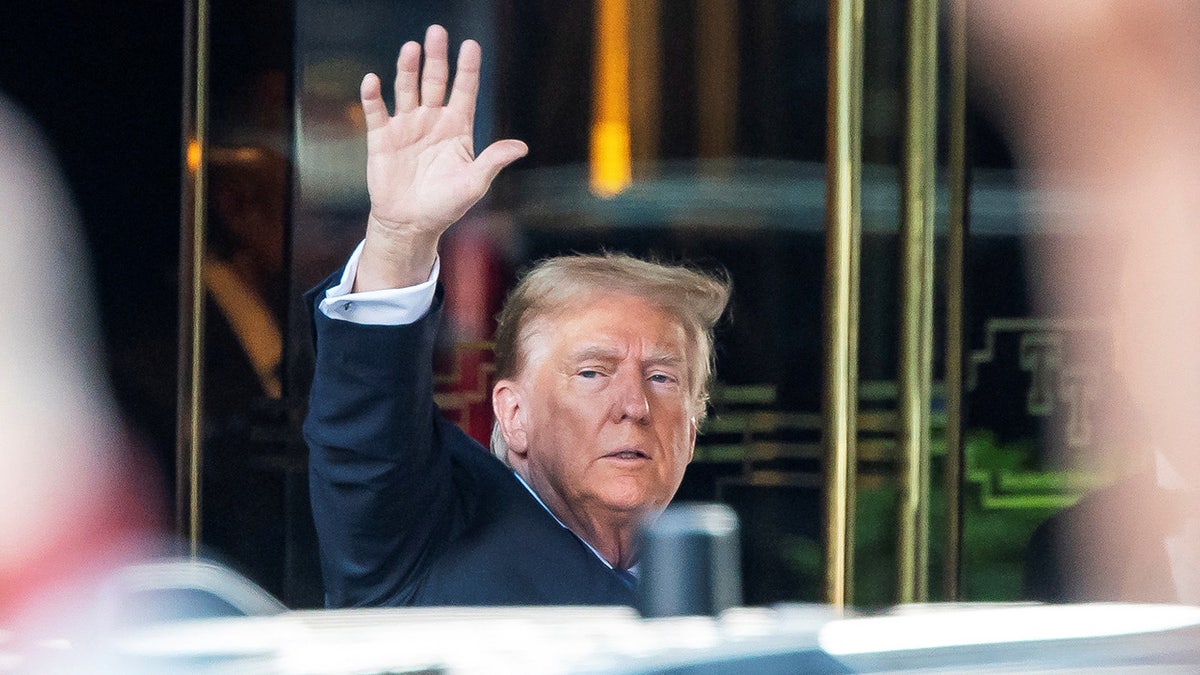
Former U.S. President Donald Trump exits Trump Tower to attend his criminal trial over charges that he falsified business records to conceal money paid to silence porn star Stormy Daniels in 2016, at Manhattan criminal court, in New York City, U.S., May 30, 2024. (REUTERS/Eduardo Munoz)
Amid the trial, Trump has repeatedly noted that security surrounding the trial has prevented most people from coming within blocks of the courthouse, which he again cited Thursday while lamenting the trial is costing the city “millions.”
TRUMP URGES JUDGE MERCHAN TO ‘SAVE HIS REPUTATION’ BY DISMISSING TRIAL
“It’s a disgrace. The millions and millions of dollars that are spent daily on this case. Outside, it looks like it’s Fort Knox … I’ve never seen so many policemen. Now, with Columbia University, you can plant a tent right in front of the main door no problem. NYU, just put your tent, don’t worry about it … But I just want to say that this is a very sad day for America. The whole world is watching and it’s a very sad day for New York,” he said.
“It’s all rigged, the whole system is rigged.”
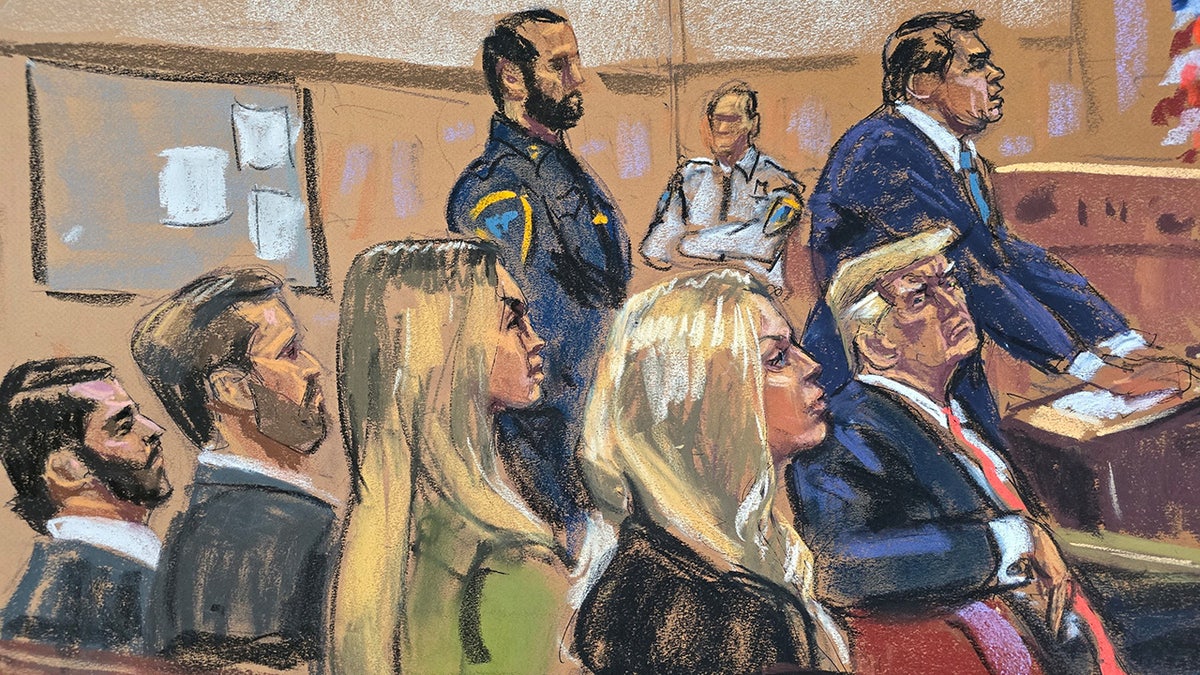
Former U.S. President Donald Trump’s children, Tiffany Trump, Donald Trump Jr and Eric Trump with his wife Lara sit next to Trump in a front row, as defense lawyer Todd Blanche presents closing arguments during Trump’s criminal trial on charges that he falsified business records to conceal money paid to silence porn star Stormy Daniels in 2016, in Manhattan state court in New York City, U.S. May 28, 2024 in this courtroom sketch. (REUTERS/Jane Rosenberg )
“The outside world is watching and the outside world is just not going to bring their business to New York. And that’s going to cost the city trillions and the state trillions and trillions of dollars. Businesses are leaving and people are fleeing,” Trump added before heading into the courtroom.
NY V. TRUMP: PROSECUTION SAYS THEY HAVE PRESENTED ‘POWERFUL EVIDENCE’ AGAINST FORMER PRESIDENT
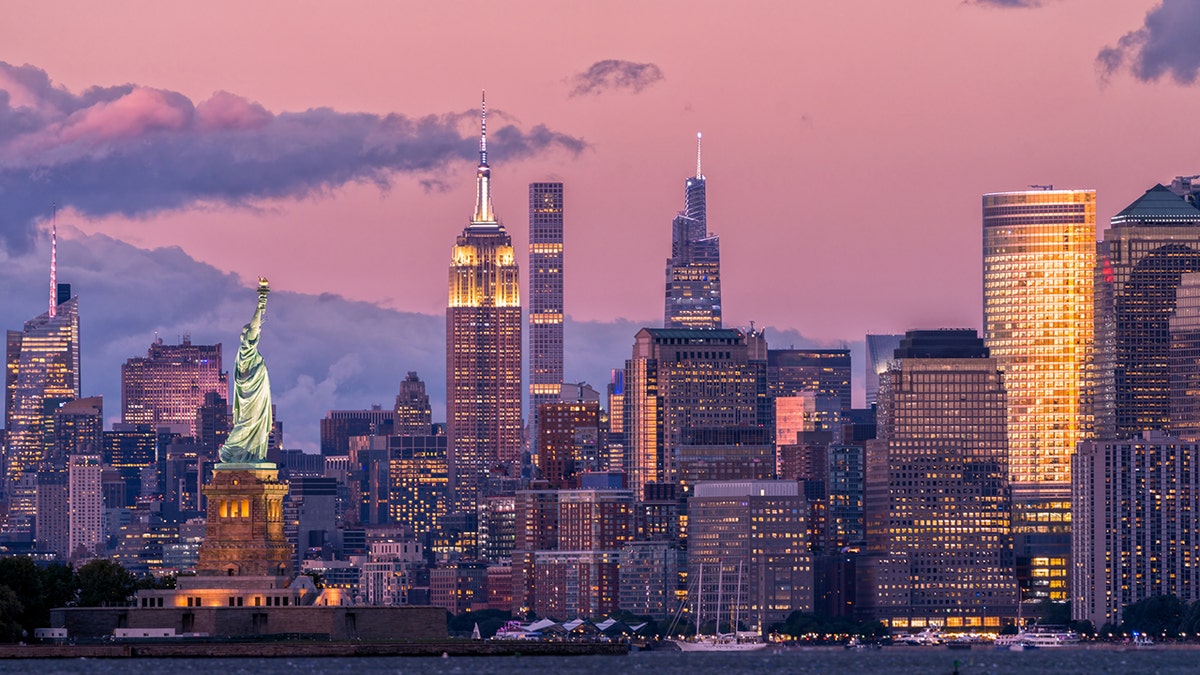
Single and The City began in New York City where founder Amber Soletti was working in the beauty industry and struggling to find her person. (iStock)
Court kicked off at 9:30 a.m. on Thursday, when Merchan again read his jury instructions after the jury sent two notes to the judge on Wednesday. In New York criminal cases, juries are not allowed to receive printed copies of jury instructions or witness transcripts.
Trump is required to remain in the courtroom as the jury considers the case in the event they send a note to the judge.
A verdict could be reached as soon as Thursday.
-

 Culture1 week ago
Culture1 week agoFrom Dairy Daddies to Trash Pandas: How branding creates fans for lower-league baseball teams
-

 News1 week ago
News1 week agoThe states where abortion is on the ballot in November : Consider This from NPR
-

 News1 week ago
News1 week agoRead Prosecutors’ Filing on Mar-a-Lago Evidence in Trump Documents Case
-

 Politics1 week ago
Politics1 week agoMichael Cohen swore he had nothing derogatory on Trump, his ex-lawyer says – another lie – as testimony ends
-

 Politics1 week ago
Politics1 week agoAnti-Israel agitators interrupt Blinken Senate testimony, hauled out by Capitol police
-

 News1 week ago
News1 week agoBuy-now, pay-later returns and disputes are about to get federal oversight
-

 World1 week ago
World1 week agoWho is Ali Bagheri Kani, Iran’s acting foreign minister?
-
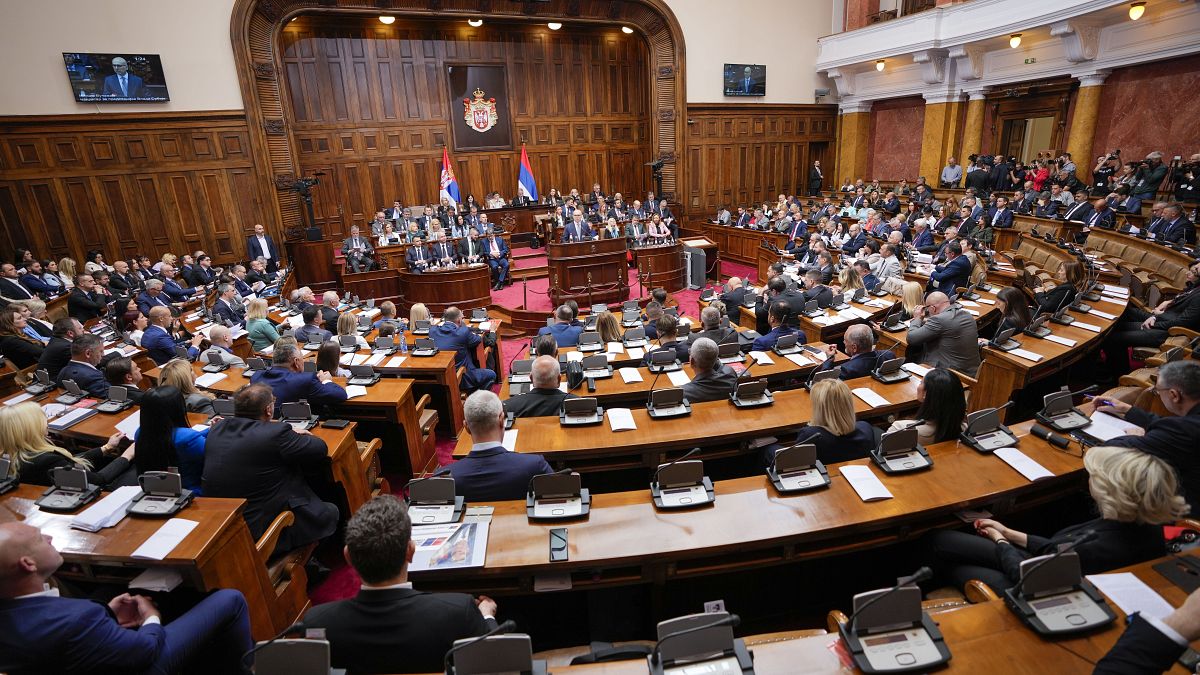
 World1 week ago
World1 week agoSerbian parliamentary minnow pushes for 'Russian law' equivalent
